Gaza has only "24 hours of water, electricity and fuel left", the regional head of the United Nations' World Health Organization (WHO) told AFP, as pressure mounts for assistance to arrive.
If aid is not allowed into the besieged territory, doctors will have to "prepare death certificates for their patients," WHO regional director for the eastern Mediterranean, Ahmed al-Mandhari, said in an interview with AFP.
Today marks ten days of relentless Israeli air strikes on targets in the Palestinian enclave, in retaliation for an 7 October attack by Gaza-based Hamas militants who killed 1,400 people, mostly civilians, in southern Israel.
Gaza is now barrelling towards "a real catastrophe", Mr Mandhari said.
The Hamas-controlled health ministry in Gaza said around 2,750 people have been killed and 9,700 wounded while, according to the UN, one million have been displaced.
Power outages threaten to cripple life-support systems, from sea water desalination plants to food refrigeration and hospital incubators.
Even everyday functions - from going to the toilet, showering and washing clothes - are almost impossible, locals say.
With emergency responders overwhelmed, doctors working around the clock and a dire lack of space, "bodies cannot be properly taken care of", Mr Mandhari said.
We need your consent to load this rte-player contentWe use rte-player to manage extra content that can set cookies on your device and collect data about your activity. Please review their details and accept them to load the content.Manage Preferences
Overcrowding has paralysed hospitals, where "intensive care units, operating rooms, emergency services and other wings" are all on the brink of collapse, he said.
Israeli Energy Minister Israel Katz yesterday said water supplies to southern Gaza had been switched back on, a week after Israel announced a "complete siege" cutting water, power and fuel supplies to the territory where it wants to crush Hamas.
Depriving civilians of goods essential for survival is banned under international law, the UN human rights chief has said.
This evening, the European Union confirmed that it will launch a humanitarian air corridor to Gaza through Egypt with the first flights expected this week.
"Palestinians in Gaza are in need of humanitarian help and aid. That is why...we are launching an EU humanitarian air bridge to Gaza through Egypt. The first two flights will start this week," European Commission President Ursula von der Leyen told a press conference in the Albanian capital Tirana, where she attended a regional Balkan summit.
The operation is consisting of "several flights to Egypt to bring lifesaving supplies to humanitarian organisations on the ground in Gaza", a statement from the Commission's Civil Protection and Humanitarian Aid (ECHO) department said.
The first two flights this week will be carrying humanitarian cargo from UNICEF including shelter items, medicines and hygiene kits, it said.
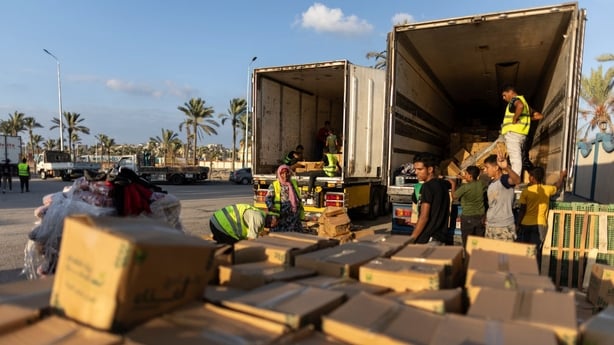
Gaza aid in doubt as Israel, Hamas deny border truce
The fate of aid deliveries and limited evacuations through the only entry to Gaza not controlled by Israel was in question, after Egyptian sources said a temporary truce was struck but Israel and Hamas said no deal was in place.
Residents of Hamas-ruled Gaza said overnight Israeli air strikes were the heaviest yet since last week. Many houses were flattened and the death toll rose inexorably, they said.
Israel has imposed a full blockade and is preparing a ground invasion to enter Gaza and destroy Hamas, which has continued to fire rockets at Israel since its cross-border assault.
Rocket-warning sirens sounded in several towns in southern Israel, the Israeli military said.
Israeli troops and tanks are already massed on the border.
Speaking tonight, Abu Obeideh, spokesman of Hamas' military wing, said the threat of an Israeli ground invasion of Gaza "doesn't scare is and we are ready for it".
In a televised statement, he said Ezzedine al-Qassam Brigades were holding 200 people captive since a massive onslaught on Israel's south on 7 October, with about 50 others held by other "resistance factions and in other places".
Authorities in Gaza said at least 2,750 people had so far been killed by the Israeli strikes, a quarter of them children, and nearly 10,000 wounded. A further 1,000 people were missing and believed to be under rubble.
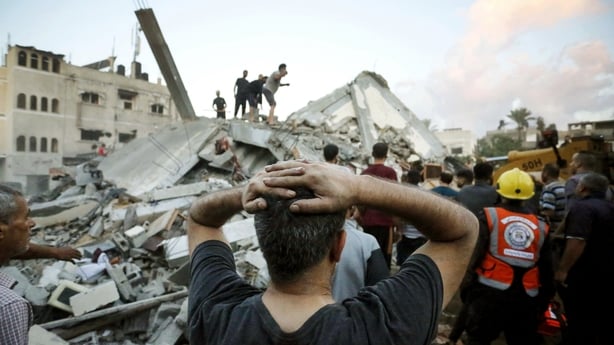
As the humanitarian crisis deepened, with food, fuel and water running short, hundreds of tonnes of aid from several countries have been held up in Egypt pending a deal for its safe delivery to Gaza and the evacuation of some foreign passport holders through the Rafah border crossing.
The Irish Department of Foreign Affairs is seeking to ensure 40 Irish citizens are among them
Earlier, Egyptian security sources had told Reuters that an agreement had been reached to open the crossing to allow aid into the enclave.
But Israeli Prime Minister Benjamin Netanyahu's office said in a statement: "There is currently no truce and humanitarian aid in Gaza in exchange for getting foreigners out."
Chief military spokesperson Rear Admiral Daniel Hagari also said there was no Gaza ceasefire and that Israel was continuing its attacks.
Hamas official Izzat El Reshiq told Reuters that there was "no truth" to the reports about the opening of the crossing with Egypt or a temporary ceasefire.
Egypt has said the crossing remained open from the Egyptian side in recent days, but was rendered inoperable due to Israeli bombardments on the Palestinian side.
Egyptian Foreign Minister Sameh Shoukry said this morning that the Israeli government had yet to take a stance that allowed the crossing to open. He called the situation faced by the Palestinian people in Gaza "dangerous".
The situation remained unclear at the Rafah crossing, the only one not controlled by Israel. Reuters journalists said a small crowd of people had gathered there waiting to enter Egypt.
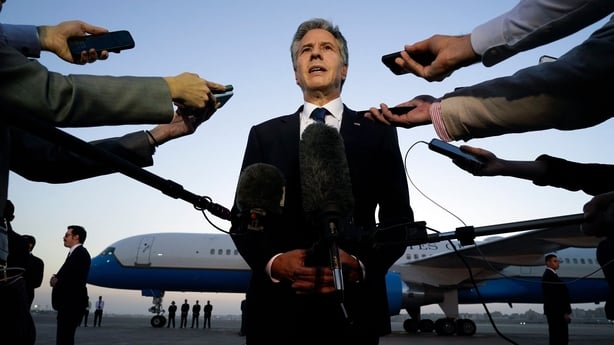
The United States had told its citizens in Gaza to get close to the crossing so they can move out. The US government estimates the number of dual-citizen Palestinian-Americans in Gaza at 500 to 600.
Washington is also seeking to secure the release of 199 hostages that Israel says were taken by Hamas back into Gaza. Among them are elderly people, women and children and foreigners, including Americans.
US President Joe Biden has sent military aid to Israel but also stressed the need to get humanitarian aid to Palestinian civilians and urged Israel to follow the rules of war in its response to the Hamas attacks.
Israeli aircraft bombed areas around Gaza City's Al-Quds hospital early today and ambulances at the facility were unable to move due to the strikes, Palestinian media reported.
Israel has urged Gazans to evacuate south, which hundreds of thousands have already done in the enclave, home to about 2.3 million people.
Hamas has told people to ignore Israel's message.
Reserves of fuel at all hospitals across Gaza are expected to last only around 24 more hours, putting thousands of patients at risk, the United Nations humanitarian office (OCHA) said.
Watch: The Israel–Palestine conflict - a brief history
In Tel Al-Hawa in Gaza City, Israeli planes bombed a main road and damaged surrounding houses, forcing hundreds of residents to take shelter in the Red Crescent's Al-Quds Hospital, residents said.
Israeli planes bombed three headquarters of the Civil Emergency and Ambulance Service in Gaza City, killing five people and paralyzing the rescue services in those areas, health officials said.
More than one million people - almost half the total population of Gaza - have been displaced within the enclave, the United Nations said. The UNWRA agency said it was struggling to cope with their needs.
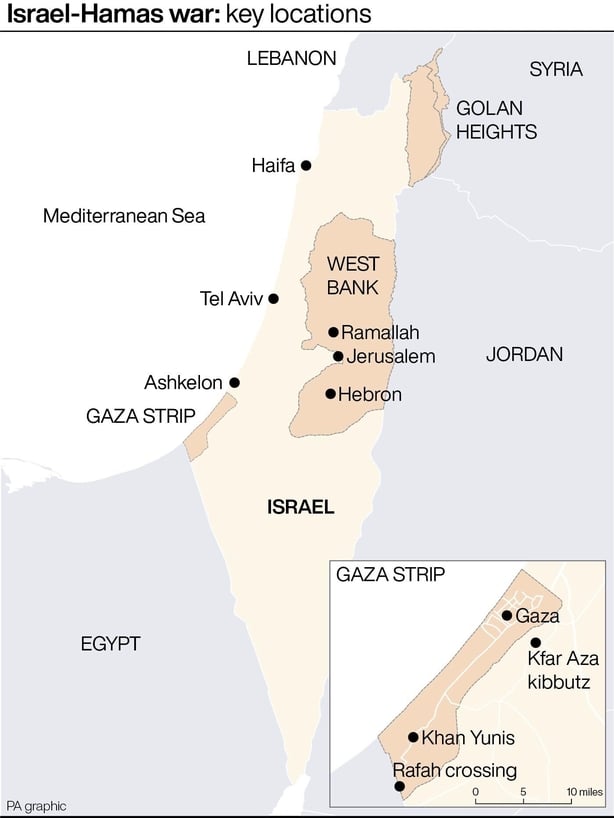
US officials have warned that the war between Israel and Hamas could escalate after cross-border clashes between Israel and militants from Lebanon's Iranian-backed Hezbollah.
As US Secretary of State Antony Blinken arrived back in Israel for talks, Iran said the United States should be held to account for its role in the conflict.
US warships have headed to the region and Israel said it would evacuate residents of 28 villages on the border with Lebanon after one came under a missile attack by Iranian-backed Hezbollah yesterday, Israeli media said a civilian was killed.
Reuters video journalist Issam Abdallah was killed on the Lebanese side of the border on Friday.
US Defense Secretary Lloyd Austin said on Thursday the United States had seen no indications that Hezbollah militants were amassing on the border to potentially attack Israel.
Read more:
Taoiseach says around 40 Irish citizens in Gaza
Death toll rises, chaos reigns as invasion of Gaza inevitable
Aid agencies' alarm
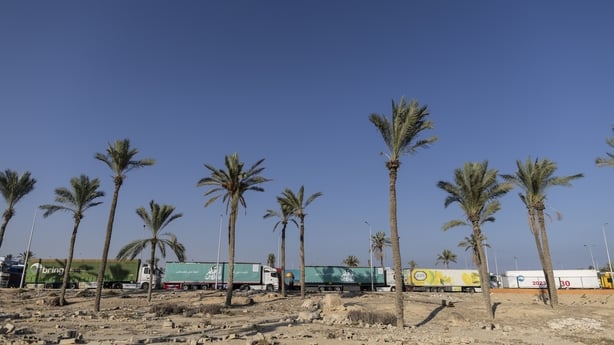
The UN has said that 47 entire families, amounting to around 500 people, have been wiped out in Israel's bombing campaign.
Foreign governments and aid agencies, including the UN and Red Cross, have repeatedly criticised Israel's evacuation order.
The UN agency supporting Palestinian refugees said that some one million Palestinians had already been displaced in the first week of the conflict - but the number was likely to be higher.
Lynn Hastings, the UN humanitarian coordinator for the Palestinian territories, said that Israel was connecting humanitarian aid into Gaza with the release of scores of hostages seized during the Hamas attack.
"Neither should be conditional," she insisted in a video posted by the UN.
"They have said they want to destroy Hamas, but their current trajectory is going to destroy Gaza."
The Israeli Defence Forces say the number of confirmed hostages being held by Hamas in Gaza has increased to 199. Yesterday, the IDF put the figure at 156.
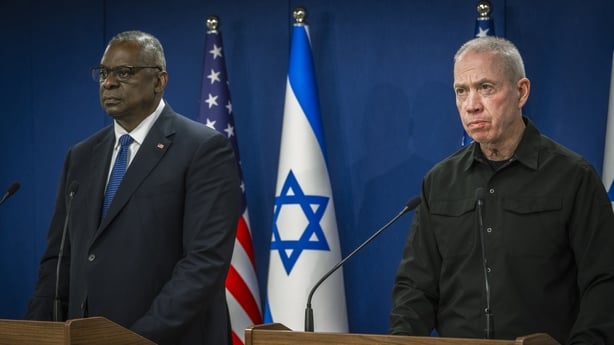
Speaking on RTÉ's Morning Ireland, Executive Director of UNICEF Ireland Peter Power said: "What we're seeing is really a potentially catastrophic humanitarian crisis unfolding right before our eyes."
He said unfettered access from the south of Gaza is now needed, along with humanitarian corridors on the western side.
It is estimated that over 60% of people in Gaza rely on aid, Mr Power said.
He said the Israeli order for Gazans to move south ahead of an expected ground offensive should be rescinded.
The mood in Israel has swung between collective grief, fury and a strong desire to punish Hamas, which Mr Netanyahu has likened to the so-called Islamic State group. It is proscribed as a terrorist group by several Western governments, including the US.
Israel said last week it had found the bodies of 1,500 Islamist militants in southern towns near the Palestinian enclave recaptured by the army.
Planeloads of Israelis have returned from around the world to join the latest of the many wars in their country's 75-year history.

